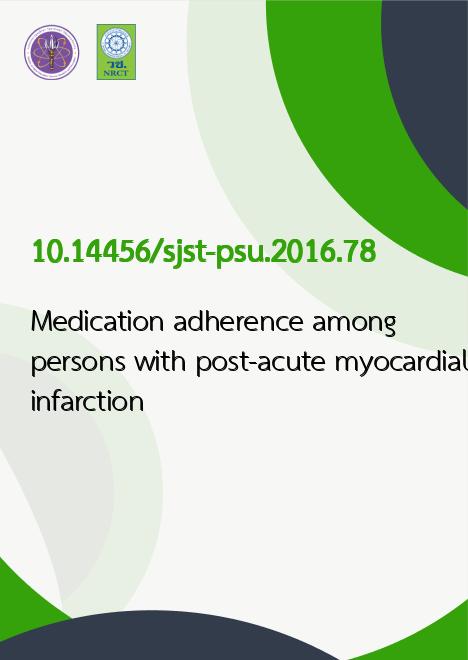
|
Medication adherence among persons with post-acute myocardial infarction |
|---|---|
| รหัสดีโอไอ | |
| Creator | 1. Rapin Polsook 2. Yupin Aungsuroch 3. Sureeporn Thanasilp |
| Title | Medication adherence among persons with post-acute myocardial infarction |
| Publisher | Research and Development Office, Prince of Songkla University |
| Publication Year | 2559 |
| Journal Title | Songklanakarin Journal of Science and Technology (SJST) |
| Journal Vol. | 38 |
| Journal No. | 6 |
| Page no. | 611-620 |
| Keyword | medication adherence,post- acute myocardial infarction |
| ISSN | 0125-3395 |
| Abstract | This study was to test a model explaining the influence of financial status, education, social support, symptom severity,barriers, knowledge, depression, and self-efficacy on medication adherence among persons with post-acute myocardialinfarction. The use of multi-stage cluster sampling method involved 348 patients from 9 regional hospitals in Thailand. Theresults revealed the hypothesized model fit to the empirical data and explained 20% of the variance of medication adherence(?2 = 5.87, df = 5, p < .43, Chi-square/df = 0.97, GIF = 0.99, RMSEA = 0.065, AGFI = 0.97). Depression was the most influentialfactor affecting medication adherence, and had a negative direct effect (-.40, p < .05), followed by self-efficacy and barriers(.17 and .10, p < .05, respectively). These findings suggest that nurses should understand that depression, barrier, and selfefficacyare important factors to be considerate to improve medication adherence and improve the quality of life of Thai postmyocardialinfarction patients. |
